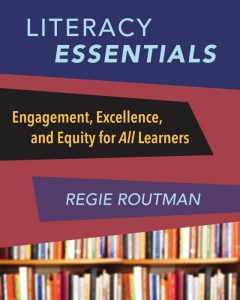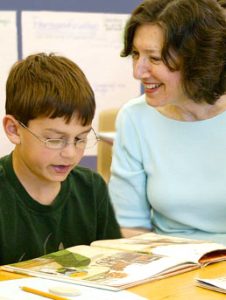 The term literacy may be one of the most misunderstood words around. For some, literacy means being able to effectively read, write, communicate and comprehend. (I’m one of the subscribers to that definition.) Yet, to others, literacy means reading—not across the content, but learning how to read and how to deepen one’s comprehension skills.
The term literacy may be one of the most misunderstood words around. For some, literacy means being able to effectively read, write, communicate and comprehend. (I’m one of the subscribers to that definition.) Yet, to others, literacy means reading—not across the content, but learning how to read and how to deepen one’s comprehension skills.
Some teachers in the content areas who subscribe to the latter definition suggest that it is not their job to teach literacy. Instead, they argue, literacy instruction belongs completely to English/Language Arts teachers and to all elementary teachers.
But does it really?
 Regie Routman, the author of a variety of books on literacy and learning, believes that literacy should be part of the work of EVERY teacher, whether s/he teaches elementary school, physics, algebra, or a foreign language. And her newest book, Literacy Essentials: Engagement, Excellence, and Equity for All Learners, is a comprehensive guide for educators who want to strengthen their students’ reading, writing, speaking, and comprehension skills across the curriculum.
Regie Routman, the author of a variety of books on literacy and learning, believes that literacy should be part of the work of EVERY teacher, whether s/he teaches elementary school, physics, algebra, or a foreign language. And her newest book, Literacy Essentials: Engagement, Excellence, and Equity for All Learners, is a comprehensive guide for educators who want to strengthen their students’ reading, writing, speaking, and comprehension skills across the curriculum.
For ease of reading and use, this 500-page book contains a detailed table of contents designed for quick searches. It is organized into three large sections entitled Engagement, Excellence, and Equity, with named chapters embedded in each. An annotated table of contents is also available, providing more specific details to the reader about each chapter.
For example, the annotated table of contents for the “Teaching with Purpose and Authority” chapter in the Engagement section highlights what you’ll find in those pages, phrased in the language of learning targets:
- Infuse purpose and authenticity in all that we do
- Plan with the end in mind
- Provide more choice within structure
- Embrace technology that enhances meaningful learning
The book establishes a personal author-reader relationship as it shifts between providing useful insight and information and evoking emotion through the intertwining of stories and/or writing samples. As an example, Routman offers a poem she wrote, inspired by editor Elizabeth Benedict’s 2013 compilation, What My Mother Gave Me: Thirty-one Women on the Gifts That Mattered Most.
It took me a lifetime to appreciate
the gifts my mother gave meShe died young, before I had become
the person I wanted to beno longer absorbed with pleasing others
or hiding my truest selffinally embracing my mother’s finest gifts,
her gracious way of beingher daily loveliness, patience and calm
even in adversityher elegance, style and flair
in living and doingher beauty and goodness, always on display
while sometimes masking her truest selfWe played it safe, both of us
unable to shift our roles and discoursefrom dutiful daughter and doting mother
to honest women and open hearted friendsleaving me with an abiding loss
for the mother I never fully knewbut also, at long last, with acceptance
and admiration for all she was
Proficient writers, readers and communicators, write, read, and communicate regularly. Effective teachers share their writing and their stories with their students and colleagues. As evidenced by this poem and the many personal stories in the book, Routman practices what she preaches.
Readers of this blog are fortunate that Regie agreed to write two blog posts for us expanding on her views, knowledge and skills. You can read them here and here. You can read other thoughtful short pieces by her at MiddleWeb, the education website founded by our ABPC communications consultant John Norton. Here’s one example: “How to Fill Your Class with Joyful Learning.”
Savor Your Read
I loved this book, so I read it slowly. In fact, it took me longer to read Literacy Essentials than most nonfiction I read. The slow read was prompted by my desire to reflect on what was written, to go online to investigate more deeply a topic or idea, or to refer to another text that affirm Routman’s point of view. This will clearly be one of my “go-to books” in months and years to come.
My Favorite Insights/Learnings
In her acknowledgments at the beginning of the book, Routman mentions Ron Berger, author of Leaders of Their Own Learning, the text we used for several years in the Powerful Conversations Network. She thanked Ron for encouraging her to write her own education story. So, it should come as no surprise that much of what was in the book resonated with me and aligned with the work of the Alabama Best Practices Center.
Take, for example, the sidebar titled, “Ten Key Factors for Excellence,” each of which is accompanied by a short explanation (pp. 102-103):
- Adaptive expertise
- Intellectual curiosity, focus, and open-mindedness
- Intentionality
- Expert interpersonal skills
- Common Sense
- Creativity
- Joyfulness
- Ability to self-reflect and self-assess
- Relentless pursuit of excellence
- Willingness to monitor and collaborate with others
Closer to the theme of her book, Routman offers five “Critical Literacy Essentials” (p. 290):
- Establish a school-wide intellectual culture and a collaborative, joyful learning environment.
- Engage students in a real-world curriculum that includes interesting literature, content worth knowing, and choice within structure.
- Ensure deep reading, writing, listening, and discussion of whole, meaningful, relevant texts and concepts across the curriculum.
- Make useful feedback and formative assessment integral to daily instruction.
- Recognize and respect every student’s language, culture, background, and strengths.
Make Teaching and Learning Joyful
 Routman believes teaching and learning should be joyful. And, she believes that the use of data can even be joyful: “I define data as all the information and evidence we collect and analyze for the purposes of celebrating, improving, and accelerating meaningful and joyful learning” (p. 322). Read that definition again and take a moment to imagine what your school—or even your classroom—could be if both teachers and students subscribed to that definition.
Routman believes teaching and learning should be joyful. And, she believes that the use of data can even be joyful: “I define data as all the information and evidence we collect and analyze for the purposes of celebrating, improving, and accelerating meaningful and joyful learning” (p. 322). Read that definition again and take a moment to imagine what your school—or even your classroom—could be if both teachers and students subscribed to that definition.
Creating Self-Determined Learners
To be literate, students need to learn how to discover what they currently don’t know. They need time daily to read books that excite them and teach them new things. And, they need to write, discuss, and reflect on what they learned.
But that’s not all. Routman believes that, with this type of teaching and learning, students can and must become self-directed learners. To Routman, that means teachers must help students become more independent learners over time and she provides an abundance of suggestions about how to help them get there.
We All Are Literacy Teachers
After reading this book, I became even more convinced that literacy instruction is central to every class, subject, and student. Routman’s ideas for teaching academic language and literacy across the disciplines literally overflow!
Science teachers can expose students to amazing nonfiction books and articles about topics as enticing as the possibility of life on other planets, the impact of the use of plastic on our oceans, the advantages of sustainable gardening, or how plate tectonics affect earthquakes and volcanoes.

Math teachers can engage students as mathematicians by expecting them to explain—both in writing and verbally—how they reached the answer to a problem. They can read about unsolved mathematics problems and ponder strategies to solve them.
Social studies teachers can convert students into historians, reminding them that history is his (or her) story. They can explore their family histories or the history of their towns and communities. Teachers can help curious kids tie the fiction and fantasy games they love to real historical events.
One of my own favorite ideas along these lines comes from former New Hampshire Teacher of the Year Angie Miller, who shifted her views on teaching historical research when one student asked her what he needed to do to get a “B” on his Renaissance project. Instead of answering that question, she asked him what would make the project more interesting to him. Learn what he told her.
You’re going to love spending some of your professional learning hours with Regie Routman. And the next time you hear someone say that teaching literacy is not their job, consider inviting them to browse Literacy Essentials.
Chances are they’ll discover that they are literacy teachers and perhaps add a few more tools to their instructional playbook.
Resources
► In this series of three informal videos, Regie Routman walks readers through the three sections of Literacy Essentials.
► Podcast interview with Angela Watson (March 2018)

0 Comments on "Review: Teaching Literacy Is Essential Across All Our Classrooms"